The food you eat has a lot to do with how your brain functions. Yes, the adage “you are what you eat” still rings true, as scientists are learning even more about how diet impacts the brain. But before we get started, a quick science lesson:
When the body is under physical or mental stress, the body releases inflammatory cytokines, chemicals that cause the immune system to activate and counteract the stress through inflammation. A little inflammation is healthy. It helps fight off illness and heals the body when you do something like cut yourself. Chronic inflammation, however, is entirely different. It’s related to autoimmune diseases like multiple sclerosis, high blood pressure and anxiety, to name a few.
You may know that 80% of the immune system is located in the digestive system, or gut. The gut helps keep the body’s immune responses and inflammation in check. What’s more, gut hormones that either reach the brain or are made in the brain directly impact cognitive function and affect your ability to stay focused, understand and process new information, recall memories and know that you are full.
That being said, a diet that is rich in brain-boosting nutrients like omega-3 fatty acids supports cognitive ability. On the contrary, a diet high in saturated fat can negatively affect cognitive ability and increase the risk of neurological dysfunction.
Fueling your body with real, nutritious, brain-healthy foods will keep your mind and body operating at peak performance, and could potentially slow cognitive decline as we age. To boost your brain power, try incorporating these ten foods into your diet.
1. Avocados
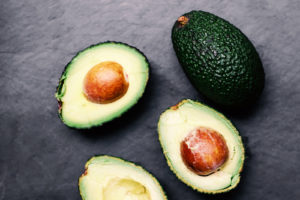 Avocados may be high in fat, but it’s the good kind of fat: monounsaturated. Monounsaturated fat regulates blood sugar levels, and it gives skin a healthy glow too.
Avocados may be high in fat, but it’s the good kind of fat: monounsaturated. Monounsaturated fat regulates blood sugar levels, and it gives skin a healthy glow too.
Avocados contain the brain-healthy compounds vitamin K and folate, which prevent blood clots and stroke, as well as improve cognitive function. They are also packed with vitamins B and C – two vitamins that are not stored in the body and therefore need to be replenished daily. Additionally, they also have the most protein and least sugar out of any fruit. Yes, avocados are fruit!
You really can’t go wrong with avocado. Use it as a substitute for eggs, butter, mayonnaise and other spreads. Add one to a smoothie or salad. And, of course, there’s always guacamole.
2. Berries
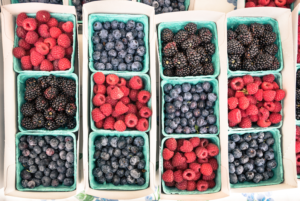 Dark berries – like blackberries, blueberries and cherries – are an excellent source of anthocyanins and other flavonoids, which are known for their demonstrated ability to protect against a myriad of diseases. They are some of the most antioxidant-rich foods on the planet.
Dark berries – like blackberries, blueberries and cherries – are an excellent source of anthocyanins and other flavonoids, which are known for their demonstrated ability to protect against a myriad of diseases. They are some of the most antioxidant-rich foods on the planet.
Berries are loaded with fiber and vitamins C and K. They also contain high levels of gallic acid, an incredibly powerful antioxidant that protects the brain from stress and degeneration.
3. Broccoli
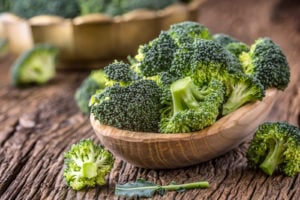 Broccoli is one of the best foods for brain health. It’s packed with fiber and vitamin K. It also contains a high amount of choline. Choline is a vitamin that plays a critical role in fetal development, and its availability to the fetus permanently influences memory function.
Broccoli is one of the best foods for brain health. It’s packed with fiber and vitamin K. It also contains a high amount of choline. Choline is a vitamin that plays a critical role in fetal development, and its availability to the fetus permanently influences memory function.
In addition to healthy brain function, choline is also linked to liver and nerve function, muscle movement, and supports a healthy metabolism and energy levels.
Citrus fruits aren’t the only way to get your daily dose of vitamin C. Just 1 cup of broccoli provides 150% of your recommended daily vitamin C intake.
4. Celery
 There are a lot of misconceptions about celery, like the idea that it’s a negative calorie food or that it offers no nutritional value. But for something that is 95% water, celery is surprisingly good for you.
There are a lot of misconceptions about celery, like the idea that it’s a negative calorie food or that it offers no nutritional value. But for something that is 95% water, celery is surprisingly good for you.
Celery contains high levels of antioxidants and polysaccharides, which are natural anti-inflammatory properties that can alleviate symptoms related to inflammation, including irritable bowel syndrome and joint pain.
When preparing celery, don’t discard the leaves. The vitamins and minerals in celery leaves are even more potent than the stalks. Celery leaves are an excellent addition to soups and stir-fries.
5. Coconut Oil
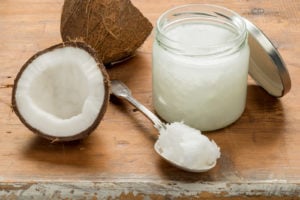 What can’t coconut oil do? It’s great to use as a replacement for cooking oil, a moisturizer for your skin, a coffee creamer or for oil pulling, and it’s also remarkably good for your brain too. Coconut oil is a natural anti-inflammatory that can also prevent memory loss and eradicate harmful bacteria in your gut.
What can’t coconut oil do? It’s great to use as a replacement for cooking oil, a moisturizer for your skin, a coffee creamer or for oil pulling, and it’s also remarkably good for your brain too. Coconut oil is a natural anti-inflammatory that can also prevent memory loss and eradicate harmful bacteria in your gut.
Use coconut as a replacement for non-stick cooking spray, butter or coffee creamer. Add it to smoothies and popcorn. Coconut oil’s medium-chain triglycerides also make it natural energy booster and a great replacement for sports drinks, which are usually loaded with sugar.
Not all coconut oil is created equal. Look for expeller-pressed or cold-pressed coconut oil that is labeled “unrefined” or “virgin.” Read nutritional information carefully. The less processed it is, the more nutritionally beneficial.
6. Eggs
 Eggs are yet another food wrongfully placed on the nutritional blacklist. If you’ve been eating only egg whites, you’re seriously missing out. Egg yolks are high in choline, which, in addition to supporting fetal brain development, also breaks down bethane, a chemical that produces happiness hormones like serotonin, dopamine and norepinephrine.
Eggs are yet another food wrongfully placed on the nutritional blacklist. If you’ve been eating only egg whites, you’re seriously missing out. Egg yolks are high in choline, which, in addition to supporting fetal brain development, also breaks down bethane, a chemical that produces happiness hormones like serotonin, dopamine and norepinephrine.
Worried about cholesterol? You shouldn’t be. According to Drew Ramsey, M.D., assistant clinical professor of psychiatry and Columbia University College of Physicians & Surgeons, there are greater issues within the American diet than cholesterol. “There’s not data to suggest that [eggs] should be at the top of people’s worries about food choices,” Dr. Ramsey says.
Even better, eggs are one of the most budget-friendly sources of protein you can get. Make sure you purchase organic, free-range eggs. Free range hens produce eggs that contain less cholesterol and saturated fat and more omega-3 fatty acids, beta-carotene and vitamins A and E than conventional battery cage hens.
7. Extra Virgin Olive Oil
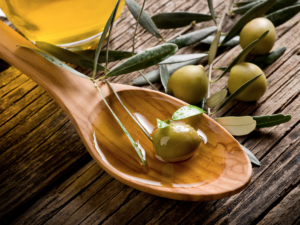 Extra virgin olive oil is rich in polyphenols: potent antioxidants that have been shown to prevent and even reverse age- and disease-related memory problems. Additionally, extra virgin olive oil improves memory and the ability to process information.
Extra virgin olive oil is rich in polyphenols: potent antioxidants that have been shown to prevent and even reverse age- and disease-related memory problems. Additionally, extra virgin olive oil improves memory and the ability to process information.
It also helps fight off ADDLs, or amyloid B-derived diffusible ligands. ADDLs are toxic proteins that attach to brain cells and make them unable to communicate with one another, which can lead to memory loss and Alzheimer’s disease.
Please note that if you want the brain benefits from extra virgin olive oil, you shouldn’t use it for cooking. At high temperatures, it hydrogenizes and starts to decompose.
Eat more extra virgin olive oil in its raw form by drizzling it on top of salads, cooked rice, hummus, pasta or soup. You could also use it as a base for homemade dressings.
Unfortunately, a lot of olive oil is low-grade and cut with cheaper oils, making it difficult to find real, 100% olive oil. When shopping for olive oil, be sure to read labels. Look for the “extra virgin” label and language that cites the specific mill that produced it. If possible, visit your local specialty food store so you can sample and purchase olive oil straight from the tap.
8. Leafy Greens
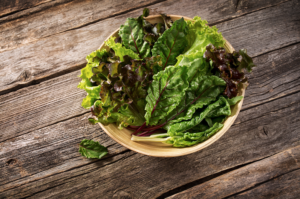 A diet that incorporates green, leafy vegetables like spinach, kale, collards, Swiss chard and romaine lettuce can help prevent dementia. One 5-year study of 950 older adults found that those who ate one to two servings of green leafy vegetables per day had the cognitive ability of a person 11 years younger than those who consumed no green leafy vegetables.
A diet that incorporates green, leafy vegetables like spinach, kale, collards, Swiss chard and romaine lettuce can help prevent dementia. One 5-year study of 950 older adults found that those who ate one to two servings of green leafy vegetables per day had the cognitive ability of a person 11 years younger than those who consumed no green leafy vegetables.
Leafy greens are full of vitamins A and K, which help control inflammation and promote bone health.
9. Salmon
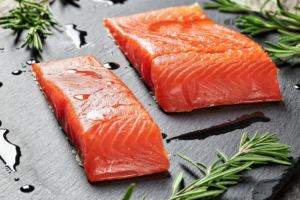 Much like coconut oil, you can’t go wrong salmon. It is loaded with omega-3 fatty acids that promote optimum brain function and memory, and prevent cancer and stave off tumors. Salmon is particularly high in the omega-3 docosahexaenoic acid, or DHA. DHA happens to be the most abundant fatty acid in the brain, so a diet that contains an adequate amount of omega-3 fatty acids promotes peak brain function.
Much like coconut oil, you can’t go wrong salmon. It is loaded with omega-3 fatty acids that promote optimum brain function and memory, and prevent cancer and stave off tumors. Salmon is particularly high in the omega-3 docosahexaenoic acid, or DHA. DHA happens to be the most abundant fatty acid in the brain, so a diet that contains an adequate amount of omega-3 fatty acids promotes peak brain function.
Substitute salmon for meat a few nights a week by grilling, baking or boiling it. If you aren’t a fan of seafood but still want the brain benefits of omega-3 fatty acids, talk to your doctor about taking a supplement like fish oil.
10. Turmeric
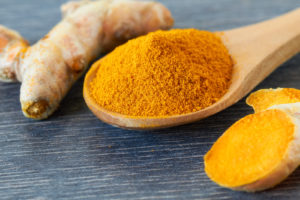 People have relied on the healing properties of turmeric, an ancient Indian herb used in curry powder, for centuries. It has been used extensively for its cleansing properties in Ayurveda, the Hindu system of medicine. Turmeric contains the chemical compound curcumin, making it one of the most potent, naturally-occurring anti-inflammatory agents out there.
People have relied on the healing properties of turmeric, an ancient Indian herb used in curry powder, for centuries. It has been used extensively for its cleansing properties in Ayurveda, the Hindu system of medicine. Turmeric contains the chemical compound curcumin, making it one of the most potent, naturally-occurring anti-inflammatory agents out there.
Turmeric, which is a part of the ginger family, keeps the immune system healthy, boosts antioxidant levels and improves the brain’s oxygen intake, which, in turn, promotes alertness and the ability to process information.
Turmeric’s warm, peppery flavor makes it a great topping for roasted vegetables. Add it to scrambled eggs, soups, rice or a smoothie.
This list isn’t exhaustive by any means, but it’s a great place to start. If you’re trying to incorporate more brain-boosting foods into your diet, but don’t have the time or energy to cook for yourself – or even shop for groceries – Bluebird Homecare can help.
Our meal preparation services are a great solution for those who are unable to cook for themselves. Bluebird caregivers can work with you to create a meal plan that meets your nutritional needs and satisfies your taste buds. We can even take care of the grocery shopping for you.
Learn more about how Bluebird Homecare can help you or your loved ones. Contact Bluebird today.